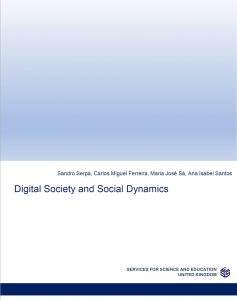Digital society and social dynamics
Sandro Serpa
- Department of Sociology, Faculty of Social Sciences and Humanities, University of the Azores
Carlos Miguel Ferreira
- ISCTE – University Institute of Lisbon
Maria José Sá
- CIPES – Centre for Research in Higher Education Policies, Portugal
Ana Isabel Santos
- Interdisciplinary Centre for Childhood and Adolescence –NICA –Uac, Portugal
- Keywords:
- Digital Literacy, Society, Sociology, Socialisation, Literacy, Innovations
- Abstract:
- We live in an increasingly digital society, in which the Internet and the intensification of interconnections in the virtual world have a central place in a context in which the digital, applied both in production (the smart industry) and – more widely and ambitiously – in society (the super-smart society), will be paramount in promoting quality of life and sustainability as economics, ecology and social equity. This e-Book offers a set of topics related to the Digital Society: Industry 4.0, Society 5.0, Digital literacy, Transversal competences, Sustainability digital innovations, Sustainability Literacy, Sociology, Socialisation, Sociology and History, Inequalities in the digital society and Sociology, Ivan Illich, Preprint, Organisational culture, Bureaucracy, Digitalisation of organisations and COVID-19. In summary, this E-book seeks to be a contribution to a more informed society, shaped by the digital in the social dynamics, in its broader concept, through a stance focused on social sciences.
- Anggraini, F. (2020). How dynamic organizations overcame the impact of COVID-19 on industry in Indonesia. SSRN. http://dx.doi.org/10.2139/ssrn.3590861
- Billy, M. (2020). The influence of dynamic organizations and the application of digital innovations to educational institutions in the world during the COVID-19 pandemic. SSRN. Retrieved from https://ssrn.com/abstract=3588233
- Ferreira, C. M., & Serpa, S. (2018). Society 5.0 and social development: Contributions to a discussion. Management and Organizational Studies, 5(4), 26-31. https://doi.org/10.5430/mos.v5n4p26
- Gladden, M. E. (2019). Who will be the members of society 5.0? Towards an anthropology of technologically posthumanized future societies. Social Sciences, 8(5), 148. https://doi.org/10.3390/socsci8050148
- Jasmine, C. A. (2020). Impacts of Covid-19 on company and efforts to support organization adaptable. SSRN. http://dx.doi.org/10.2139/ssrn.3590726
- Putrivi, N. (2020). How digital innovation and dynamic organization concept can help creative industries to survive COVID-19 global pandemic. SSRN. http://dx.doi.org/10.2139/ssrn.3590926
- Sá, M. J., & Serpa, S. (2020). The global crisis brought about by SARS-CoV-2 and its impacts on education: An overview of the Portuguese panorama. Science Insights Education Frontiers, 5(2), 525-530. http://dx.doi.org/10.2139/ssrn.3565613
- Santos, A. I., & Serpa, S. (2017). The importance of promoting digital literacy in higher education. International Journal of Social Science Studies, 5(6), 90-93. https://doi.org/10.11114/ijsss.v5i6.2330
- Santos, A. I., & Serpa, S. (2020). Literacy: Promoting sustainability in a digital society. Journal of Education, Teaching and Social Studies, 2(1), 1-9. https://doi.org/10.22158/jetss.v2n1p1
- Serpa, S., & Ferreira, C. M. (2019). Society 5.0 and sustainability digital innovations: A social process. Journal of Organizational Culture, Communications and Conflicts, 23(1), 1-14. Retrieved from https://www.abacademies.org/articles/Society-5.0-and-Sustainability-Digital-Innovations-A-Social-Process-1939-4691-23-1-129.pdf
- Serpa, S., & Ferreira, C. M. (2020). Sustainability and digital as challenges of sociology. Journal of Educational and Social Research, 10(2), 15-23. https://doi.org/10.36941/jesr-2020-0023
- Serpa, S., Ferreira, C. M., & Santos, A. I. (2020). Personal argumention in the scholarly publication. Journal of Educational and Social Research, 10(2), 1-4. https://doi.org/10.36941/jesr-2020-0021

Published
- August 10, 2020
Categories
Copyright
- Copyright (c) 2020 Sandro Serpa
License
This work is licensed under a Creative Commons Attribution 4.0 International License.